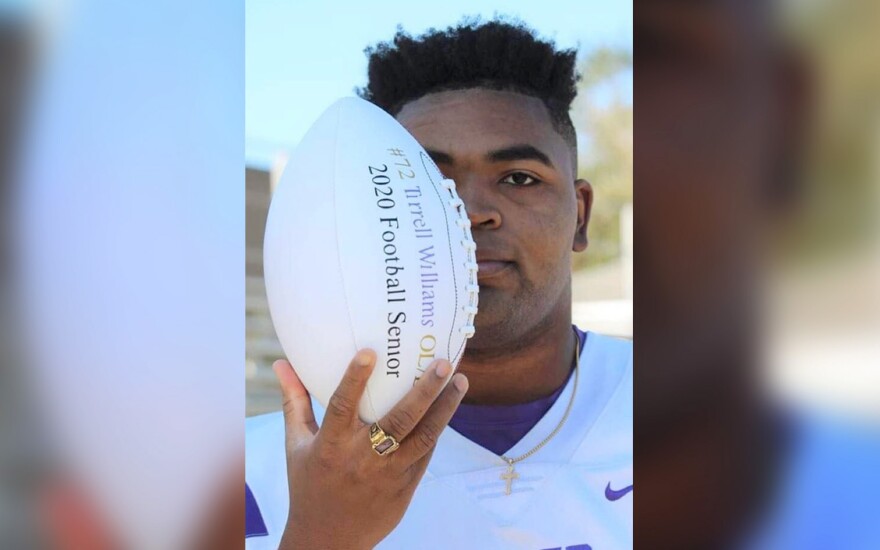Even after the death of a 19-year-old lineman in August following a grueling punishment workout, the chairman of Fort Scott Community College's elected board of trustees says it hasn't received a detailed briefing about the player's death.
“The board doesn't actually control exactly what is done," John Bartelsmeyer told KCUR at Monday night's monthly board meeting. “Specifically, I can't say there's anything that has been brought up to change, other than to make sure that all of our athletes are — I hate to say the word taken care of — but overseen.”
KCUR learned that Tirrell Williams collapsed after running eight or nine gassers — sprints back and forth across the practice field. According to several players, the team was being punished after lawyer-turned-coach Carson Hunter discovered a candy wrapper on the practice field.
KCUR also learned that Hunter did not provide water for players, telling several team members that "water is for the weak." Williams died two weeks after collapsing on the field and lapsing into a coma.
Both FSCC President Alysia Johnston and Athletic Director and Vice President of Student Affairs Tom Havron denied any wrongdoing by the school in Williams' death.
“I'm satisfied with the president and the athletic director and the administration,” Bartelsmeyer said.
The southeast Kansas college discontinued its football program after 93 years at its November meeting. The decision was taken behind closed doors in executive session and only announced in a statement. Johnston said that she ended the football program because it was getting too expensive and that it had nothing to do with Williams' death.
Havron said FSCC now has a trainer and what he called a trainer tech, and suggested that without football heat is less of a concern.
“It's not as big of an issue as it was during that one isolated evening,” he said after Monday's meeting.
However, KCUR learned that three track athletes also suffered heat issues after Williams collapsed. All three were taken to the hospital but recovered, according to Havron.

The death in Fort Scott and the death three years ago of Braeden Bradforth at Garden City Community College was one reason for a meeting Tuesday of trainers, doctors and coaches across the county to discuss whether there's a better way to teach coaches about the danger of exertional heatstroke.
University of Oklahoma head trainer Scott Anderson, who convened the meeting, said he's worried that football people think "we're in an era of safety," but "that's just not the case."
In a November 2021 column, “The Heat Is On: Exertional Heatstroke in Football,” in the journal Current Sports Medicine Reports, former University of Oklahoma team doctor Randy Eichner wrote: “In a span of just 2 months last summer, from late June to late August, nine football players collapsed and died. All nine were linemen. All nine were at the mercy of demanding coaches in brutal heat. All nine were teenagers.”
Echiner has called punishment practices and the denial of water, which happened at both Fort Scott and Garden City, part of a "warrior culture" among football coaches.
"If they play in a warrior culture, that's how they coach," Anderson told KCUR.
Bradforth's family settled a lawsuit against GCCC in August 2020 for $500,000. The Williams family is considering whether to sue FSCC.





